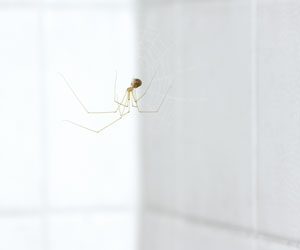 While seeing spiders is a normal part of daily life throughout the entire year, they are especially abundant in the fall months. Every year when temperatures begin to drop, spiders start to move inside of homes for shelter and in search of a mate. As with most pests, spiders dislike cooler weather and are attracted to the dark, warm areas easily found inside of homes. Although most species won’t cause harm, no homeowner want a spider infestation. Thankfully, there are a number of ways you can prevent spiders from getting inside of your property in the first place. Read on for Rentokil’s top spider prevention tips for this fall and all year long.
While seeing spiders is a normal part of daily life throughout the entire year, they are especially abundant in the fall months. Every year when temperatures begin to drop, spiders start to move inside of homes for shelter and in search of a mate. As with most pests, spiders dislike cooler weather and are attracted to the dark, warm areas easily found inside of homes. Although most species won’t cause harm, no homeowner want a spider infestation. Thankfully, there are a number of ways you can prevent spiders from getting inside of your property in the first place. Read on for Rentokil’s top spider prevention tips for this fall and all year long.
What are Spiders Attracted To?
Like any pest, spiders are driven indoors for survival-based reasons. Some of the things inside your property that spiders may be attracted to include:
- Food: If you have other types of insects inside your home due to leaving out food or messes, spiders will appear to feed on those insects.
- Clutter: Piles of debris, clothes, garbage, or anything else are the perfect hiding spots for spiders.
- Warmth & darkness: Darker, warm areas of the home are sought out by spiders.
How to Spider-Proof Your Home
Except for black widows and desert brown spiders, most spiders are harmless and not aggressive. That said, no one wants to deal with an excess of spiders in their home, no matter what type they are! Successfully keeping spiders out of your home requires the same efforts needed for all types of pest control:
- Locate and seal any potential entry points for spiders. This includes patching up holes, cracks, crevices, and the like in your windows, doors, and more.
- Always inspect old boxes or pieces of furniture for spiders before bringing them indoors in case spiders are lurking.
- Keep a tidy home. As mentioned previously, clutter and messes provide ample shelter for spiders.
- Take proper care of your lawn and landscape. Untrimmed shrubbery and overgrown grass may draw spiders to your property, eventually allowing them indoors.
How to Get Rid of Spiders
Even when you’ve tried to seal your home from spiders, they may still be able to make their way indoors. DIY spider control only works so well, and seeing an excess of spiders inside your home signals that you need to call a professional pest control company. Expert pest technicians, such as those found at Rentokil, can not only locate the source of your spider problem but also keep future infestations from occurring.

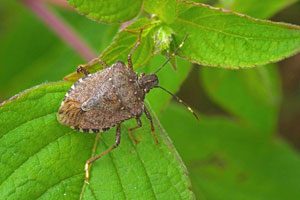 Pest problems in Las Vegas are at their highest in the fall, but what happens to these pests when the weather cools down? The number of infestations in the autumn months can skyrocket as pests try to find a place to overwinter, which is why the time to protect your home is now! To keep pests and insects out of your home this fall and winter, read on to learn some of Rentokil’s top tips for preventing fall pests in your home.
Pest problems in Las Vegas are at their highest in the fall, but what happens to these pests when the weather cools down? The number of infestations in the autumn months can skyrocket as pests try to find a place to overwinter, which is why the time to protect your home is now! To keep pests and insects out of your home this fall and winter, read on to learn some of Rentokil’s top tips for preventing fall pests in your home.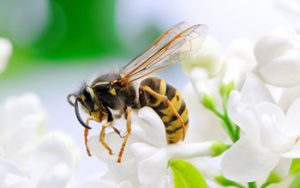 Have you ever noticed that yellow jackets in the Las Vegas area are more aggressive during the fall? You’re not wrong! As summer comes to a close, these wasps notoriously become more hostile as they leave their nests and seek out resources to survive the winter. This is when they typically will invade outdoor barbecues and picnics in the fall. Because yellow jackets can sting more than once, it’s important to know how to protect you and your family from their aggressive behavior throughout the autumn months.
Have you ever noticed that yellow jackets in the Las Vegas area are more aggressive during the fall? You’re not wrong! As summer comes to a close, these wasps notoriously become more hostile as they leave their nests and seek out resources to survive the winter. This is when they typically will invade outdoor barbecues and picnics in the fall. Because yellow jackets can sting more than once, it’s important to know how to protect you and your family from their aggressive behavior throughout the autumn months.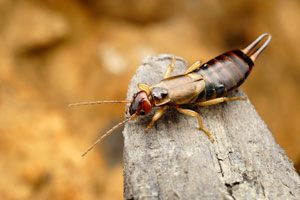 Earwigs are in full force during the summer, and it’s easy to understand why you may be wary of spotting one in or near your home. Urban legend has led people to believe these bugs are able to tunnel through your ear canal, but, thankfully, that’s simply not true. Despite their somewhat menacing pincers, earwigs are nearly harmless to humans and certainly do not engage in any ear-crawling! That said, it’s still important to know how to identify earwigs in order to prevent any problems they may cause.
Earwigs are in full force during the summer, and it’s easy to understand why you may be wary of spotting one in or near your home. Urban legend has led people to believe these bugs are able to tunnel through your ear canal, but, thankfully, that’s simply not true. Despite their somewhat menacing pincers, earwigs are nearly harmless to humans and certainly do not engage in any ear-crawling! That said, it’s still important to know how to identify earwigs in order to prevent any problems they may cause.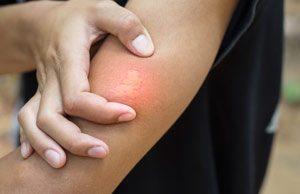 Chances are, most people have been or will be stung by a bee at some point in their life. As painful and surprising as they may be at the time, stings often heal quickly and without complication. Nonetheless, it’s important to take action after being stung! While there are certainly a number of over-the-counter treatments to choose from, you don’t need to stop by the store. Luckily, there are several all-natural remedies that can work to heal a sting right at home.
Chances are, most people have been or will be stung by a bee at some point in their life. As painful and surprising as they may be at the time, stings often heal quickly and without complication. Nonetheless, it’s important to take action after being stung! While there are certainly a number of over-the-counter treatments to choose from, you don’t need to stop by the store. Luckily, there are several all-natural remedies that can work to heal a sting right at home. As tiny as they are, fleas and ticks can be dangerous pests if they are brought into the home by its residents or pets. These two insects are both parasitic, meaning they feed on the blood of their hosts to survive. Ticks in particular pose an immense risk in that they can pass blood-borne diseases, such as Lyme disease, to their hosts. Cats and dogs are most commonly affected by fleas and ticks, and can spread them throughout Las Vegas homes once inside.
As tiny as they are, fleas and ticks can be dangerous pests if they are brought into the home by its residents or pets. These two insects are both parasitic, meaning they feed on the blood of their hosts to survive. Ticks in particular pose an immense risk in that they can pass blood-borne diseases, such as Lyme disease, to their hosts. Cats and dogs are most commonly affected by fleas and ticks, and can spread them throughout Las Vegas homes once inside.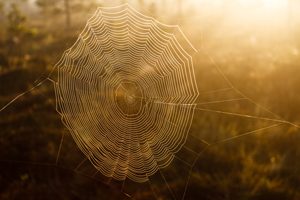 Very few people welcome the sight of a spider in or near their home, and it can be a frightening experience for many! While most spiders are typically harmless and actually beneficial to the environment, there are a few in the Las Vegas area to be wary of. Along with the desert brown spider, black widows are not only one of the most common spiders in Southern Nevada but also the most dangerous. Although they only bite when threatened, there are a number of ways you can prevent these poisonous spiders from getting in or near your home.
Very few people welcome the sight of a spider in or near their home, and it can be a frightening experience for many! While most spiders are typically harmless and actually beneficial to the environment, there are a few in the Las Vegas area to be wary of. Along with the desert brown spider, black widows are not only one of the most common spiders in Southern Nevada but also the most dangerous. Although they only bite when threatened, there are a number of ways you can prevent these poisonous spiders from getting in or near your home. Summer’s here and the vacation you’ve been planning for months is quickly approaching. Even though the last thing you want to worry about while traveling is pests, the truth is you should always be cautious of bed bugs. Even worse, infestations are known to start after bringing the tiny bugs home in your suitcase after a getaway. To avoid having these uninvited guests accompany you back to your Las Vegas residence after a trip, read on to learn Western Exterminator of Las Vegas’ best tips for making sure your travels are bed bug-free!
Summer’s here and the vacation you’ve been planning for months is quickly approaching. Even though the last thing you want to worry about while traveling is pests, the truth is you should always be cautious of bed bugs. Even worse, infestations are known to start after bringing the tiny bugs home in your suitcase after a getaway. To avoid having these uninvited guests accompany you back to your Las Vegas residence after a trip, read on to learn Western Exterminator of Las Vegas’ best tips for making sure your travels are bed bug-free!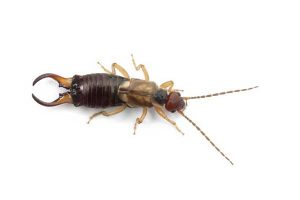 Contrary to urban myths, earwigs do not burrow into people’s ear canals! Old legends claimed that these little silverfish-looking bugs make their way into ear canals and lay eggs, but that’s simply not true. That said, many people still fear these pesky little insects and worry about their ability to bite. Despite their intimidating looking pincers, earwigs very rarely bite humans. At worst, they will use their forceps (cerci) to pinch when threatened. Thankfully, their pinches are very minor and cause little discomfort!
Contrary to urban myths, earwigs do not burrow into people’s ear canals! Old legends claimed that these little silverfish-looking bugs make their way into ear canals and lay eggs, but that’s simply not true. That said, many people still fear these pesky little insects and worry about their ability to bite. Despite their intimidating looking pincers, earwigs very rarely bite humans. At worst, they will use their forceps (cerci) to pinch when threatened. Thankfully, their pinches are very minor and cause little discomfort! Although pest control methods today are almost always safe for you and your family, are they safe for your pets as well? At Western Exterminator of Las Vegas, we are happy to provide pet-friendly pest solutions and are proud to use procedures that are pet-safe during and after treatment. We understand why homeowners are concerned when it comes to pest control, which is why we are dedicated to keeping our methods safe for your entire family, including the four-legged members!
Although pest control methods today are almost always safe for you and your family, are they safe for your pets as well? At Western Exterminator of Las Vegas, we are happy to provide pet-friendly pest solutions and are proud to use procedures that are pet-safe during and after treatment. We understand why homeowners are concerned when it comes to pest control, which is why we are dedicated to keeping our methods safe for your entire family, including the four-legged members!